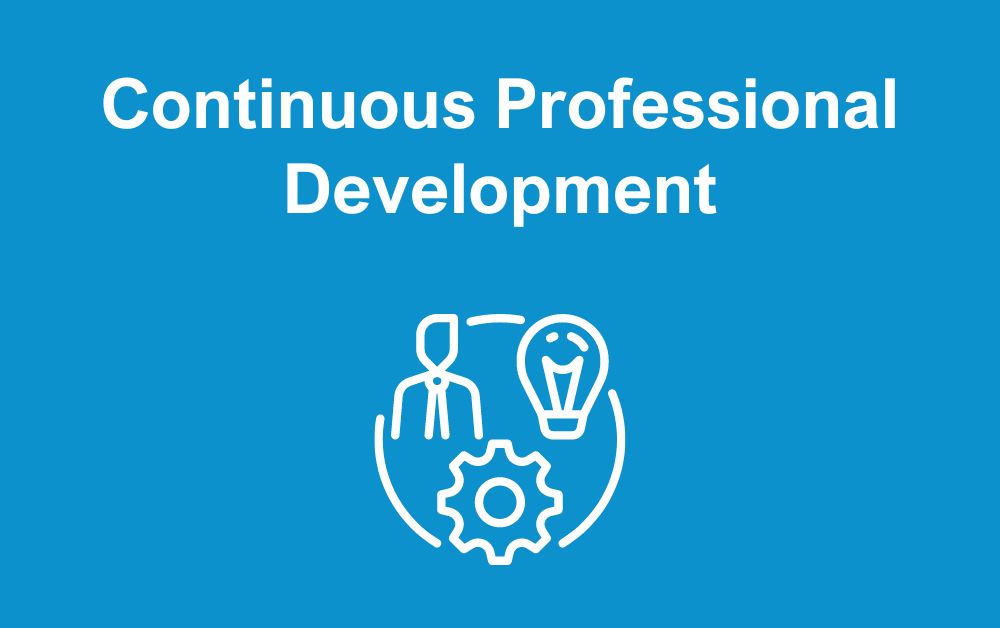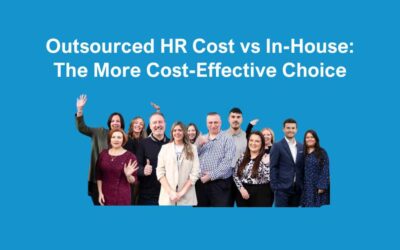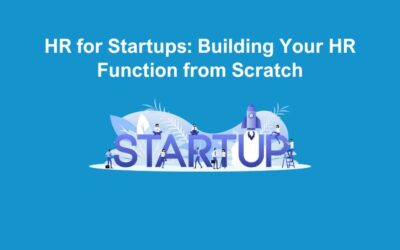In today’s dynamic and ever-evolving workplace landscape, the concept of continuous professional development (CPD) stands as a cornerstone for both your personal and organisational growth. At the heart of every successful enterprise lies a workforce committed to learning and development, constantly seeking to enhance their skills, knowledge, and capabilities. As the saying goes, “knowledge is power,” and in the realm of business, this power translates into a competitive advantage that can propel you towards unprecedented levels of success.
At The HR Booth, we recognise the paramount importance of CPD in fostering a culture of excellence and innovation. Through our internal lunch and learn sessions and training workshops for clients, we champion the cause of lifelong learning, empowering you and your team to thrive in a rapidly changing world. In this blog post, we delve deeper into the significance of CPD and explore the myriad of benefits it can bring to you, your employees, and your organisation.
Enhanced Skills and Competencies
Continuous professional development serves as a catalyst for skill enhancement and competency development. By engaging in targeted training sessions and workshops, you can acquire new skills, refine existing ones, and stay abreast of the latest industry trends and best practices. This not only boosts your individual performance but also enhances the collective capabilities of your workforce, fostering a culture of excellence within your organisation.
Enhanced skills and competencies serve as the cornerstone of individual and organisational success in today’s rapidly evolving business landscape. At The HR Booth, we recognise the paramount importance of fostering a culture of continuous learning and development to empower you and your team to thrive in a competitive market environment. By investing in skills enhancement and competency development, organisations can unlock untapped potential, drive innovation, and remain agile in the face of change.
One of the key benefits of enhanced skills and competencies is the ability to adapt and evolve in response to shifting industry trends and technological advancements. By staying abreast of the latest developments and acquiring new skills, employees can future-proof their careers and remain relevant in an increasingly digital and globalised economy. Whether it’s mastering new software tools, honing communication and leadership abilities, or developing expertise in emerging fields, continuous learning enables individuals to broaden their skill sets and seize new opportunities for growth and advancement.
Moreover, enhanced skills and competencies not only benefit individual employees but also contribute to the overall success and competitiveness of the organisation. A skilled and knowledgeable workforce is better equipped to tackle complex challenges, drive innovation, and deliver superior outcomes for clients and customers. By fostering a culture of learning and providing opportunities for skills development, organisations can cultivate a talent pool that is capable, motivated, and committed to achieving excellence. Ultimately, investing in enhanced skills and competencies is not just an investment in the present but a strategic imperative for long-term success and sustainability.
Increased Job Satisfaction and Motivation
Investing in CPD demonstrates a commitment to employee growth and development, which in turn enhances job satisfaction and motivation. When employees feel supported in their professional journey and have access to opportunities for learning and advancement, they are more likely to feel engaged, fulfilled, and invested in their roles. This leads to higher levels of productivity, retention, and overall job satisfaction.
Increased job satisfaction and motivation are pivotal components of a thriving workplace culture, essential for fostering employee engagement, retention, and productivity. At The HR Booth, we understand the intrinsic link between job satisfaction, motivation, and overall organisational success. By prioritising the well-being and fulfilment of employees, organisations can create a positive work environment where individuals feel valued, supported, and inspired to perform at their best.
One of the key drivers of increased job satisfaction and motivation is providing employees with opportunities for growth, development, and advancement. When individuals are given the chance to expand their skills, take on new challenges, and progress in their careers, they feel a sense of fulfilment and purpose in their work. This not only boosts morale and job satisfaction but also fosters a sense of loyalty and commitment to the organisation.
Recognising and rewarding employees for their contributions and achievements play a crucial role in enhancing job satisfaction and motivation. Whether through formal recognition programs, praise from managers, or opportunities for advancement, acknowledging employees’ efforts and successes helps to reinforce positive behaviours and attitudes. By creating a culture of appreciation and empowerment, organisations can cultivate a motivated and engaged workforce that is invested in the company’s mission and committed to delivering exceptional results. Ultimately, increased job satisfaction and motivation are not just beneficial for individual employees but are integral to building a high-performance culture that drives organisational success and sustainable growth.
Adaptability and Resilience
In today’s fast-paced business environment, adaptability and resilience are indispensable qualities for success. Continuous professional development equips employees with the skills and knowledge needed to navigate change, overcome challenges, and thrive in uncertain times. By fostering a learning culture that encourages experimentation and innovation, organisations can cultivate a workforce that is agile, flexible, and resilient in the face of adversity.
Adaptability and resilience are indispensable qualities in navigating the complexities and uncertainties of today’s business landscape. At The HR Booth, we recognise the critical importance of fostering these attributes within our clients’ workforce to thrive amidst constant change and disruption. Adaptability refers to your ability to adjust and pivot in response to shifting circumstances, while resilience entails bouncing back from setbacks and adversity with strength and determination.
In a rapidly evolving environment, organisations must embrace adaptability to remain agile and responsive to emerging challenges and opportunities. This involves encouraging a culture of innovation, experimentation, and continuous learning, where employees feel empowered to embrace change and explore new ways of working. By fostering a mindset of adaptability, organisations can harness the collective creativity and problem-solving skills of their workforce to drive innovation and stay ahead of the curve.
Similarly, resilience is essential for weathering the inevitable storms and setbacks that accompany the pursuit of business goals. Resilient individuals and teams possess the mental fortitude and emotional intelligence to overcome obstacles, learn from failures, and emerge stronger and more resilient than before. By providing support, resources, and encouragement, organisations can cultivate a resilient workforce that thrives in the face of adversity, demonstrating perseverance, optimism, and a readiness to tackle whatever challenges lie ahead. Ultimately, adaptability and resilience are not just desirable traits but are essential for building a resilient, future-ready organisation that can navigate uncertainty and thrive in a rapidly changing world.
Improved Performance and Productivity
CPD directly correlates with improved performance and productivity at both individual and organisational levels. As you gain new insights, tools, and techniques through training and development initiatives, you become better equipped to perform your role effectively and efficiently. This translates into tangible results, such as increased efficiency, higher quality outputs, and greater customer satisfaction, ultimately driving business success.
Performance and productivity are two intertwined pillars that underpin the success and sustainability of any organisation. Performance refers to the effectiveness and efficiency with which tasks and objectives are accomplished, while productivity measures the output generated relative to the input of resources, such as time, effort, and capital. Together, they form the backbone of operational excellence and are essential for driving growth, innovation, and competitive advantage in today’s dynamic business environment.
At The HR Booth, we understand the critical role that performance and productivity play in achieving business objectives and fostering a culture of continuous improvement. High-performance teams are characterised by their ability to consistently deliver results, exceed expectations, and adapt to changing circumstances with agility and resilience. This requires clear goal-setting, regular feedback and coaching, and a supportive work environment that empowers individuals to perform at their best.
Productivity, on the other hand, is not merely about working harder but working smarter. It involves optimising processes, streamlining workflows, and leveraging resources effectively to maximise output while minimising waste and inefficiency. By implementing best practices, harnessing technology, and fostering a culture of innovation and collaboration, organisations can enhance productivity across all levels of the workforce, driving operational excellence and sustainable growth.
Moreover, performance and productivity are closely interconnected, with improvements in one often leading to enhancements in the other. When you are empowered to perform at your peak, you are more likely to be engaged, motivated, and productive, resulting in higher-quality outputs and increased efficiency. Conversely, when productivity is maximised, you can focus your efforts on high-value tasks and initiatives that contribute to overall performance and organisational success.
Talent Attraction and Retention
In today’s competitive labour market, top talent is in high demand, and organisations must differentiate themselves as employers of choice. Offering robust CPD opportunities not only attracts skilled professionals to your organisation but also fosters loyalty and retention among existing employees. When individuals see a clear path for growth and advancement within the company, they are more likely to stay committed for the long term.
Talent attraction and retention stand as pivotal pillars in the foundation of a successful business, integral to maintaining a competitive edge and fostering sustainable growth. At The HR Booth, we recognise the paramount importance of not only attracting top talent to our clients’ organisations but also nurturing an environment where employees feel valued, engaged, and motivated to stay. Crafting an effective talent attraction strategy begins with a deep understanding of your organisation’s unique value proposition and effectively communicating this to potential candidates. By showcasing your company culture, growth opportunities, and commitment to employee development, organisations can appeal to candidates who resonate with their values and vision.
Once talent is onboarded, the focus shifts to retention, ensuring that employees remain committed and invested in the organisation for the long term. This entails creating a positive work environment where employees feel supported, recognised, and challenged in their roles. Offering competitive compensation and benefits packages, clear paths for career advancement, and promoting a healthy work-life balance are essential components of a comprehensive retention strategy. Additionally, providing ongoing training and development opportunities signals a commitment to investing in employees’ growth and professional advancement, fostering a sense of loyalty and belonging.
Furthermore, cultivating a culture of open communication, transparency, and collaboration can bolster employee engagement and retention. By actively seeking feedback, addressing concerns, and involving employees in decision-making processes, organisations empower their workforce to feel valued and invested in the company’s success. Ultimately, talent attraction and retention are not merely HR initiatives but strategic imperatives that demand a collective effort from leadership and managers across the organisation. By prioritising talent attraction and retention, organisations can build a high-performing workforce that drives innovation, productivity, and sustained success.
Innovation and Creativity
Continuous learning fuels innovation and creativity by exposing employees to new ideas, perspectives, and methodologies. By encouraging employees to step outside their comfort zones and explore unfamiliar territory, organisations can stimulate creativity, drive innovation, and stay ahead of the curve in an increasingly competitive marketplace. Embracing a culture of lifelong learning fosters a spirit of curiosity and experimentation, paving the way for breakthroughs and advancements.
Innovation and creativity are the engines of progress and differentiation in today’s competitive business landscape. At The HR Booth, we understand the paramount importance of fostering a culture that nurtures and celebrates innovation and creativity within our clients’ organisations. Innovation involves the development and implementation of new ideas, processes, or products that create value and drive growth. Creativity, on the other hand, is the ability to generate novel and imaginative solutions to problems or challenges. Together, these twin forces fuel the engine of innovation, enabling organisations to stay ahead of the curve and adapt to changing market dynamics.
One of the key drivers of innovation and creativity is creating an environment that encourages experimentation, risk-taking, and exploration of new ideas. By fostering a culture where employees feel empowered to challenge the status quo, voice their opinions, and pursue innovative solutions, organisations can unlock the full potential of their workforce. Encouraging cross-functional collaboration and diversity of thought also plays a crucial role in stimulating creativity and fostering innovation. By bringing together individuals with diverse backgrounds, perspectives, and expertise, organisations can harness the power of collective intelligence to generate breakthrough ideas and drive meaningful change.
Providing the necessary resources, support, and recognition for innovative initiatives is essential for fostering a culture of innovation and creativity. This includes investing in research and development, fostering partnerships with external stakeholders, and recognising and rewarding employees for their contributions to innovation. By creating a culture that values and prioritises innovation, organisations can cultivate a dynamic and adaptive workforce that is capable of navigating uncertainty and seizing opportunities for growth and advancement. Ultimately, innovation and creativity are not just desirable traits but are essential for driving business success and staying ahead in today’s rapidly evolving marketplace.
Putting it into Practice
Our recent lunch and learn session with Calum proved to be an invaluable opportunity for our team at The HR Booth to delve deep into the intricacies of creating effective job adverts. Calum’s expertise and insights provided us with a comprehensive understanding of the essential elements that make job adverts stand out in a competitive market. From crafting compelling job titles to structuring clear and concise job descriptions, we learned the importance of capturing the attention of potential candidates and clearly communicating the expectations and requirements of the role.
One of the key takeaways from the session was the significance of tailoring job adverts to target the right audience effectively. Calum emphasised the importance of understanding the demographics, preferences, and motivations of the desired talent pool, allowing us to tailor our messaging and approach accordingly. Additionally, we explored strategies for optimising job adverts for online platforms, such as incorporating relevant keywords and utilising eye-catching visuals to enhance visibility and engagement.
Armed with the knowledge and insights gained from this session, you are now better equipped to assist your clients in creating job adverts that resonate with their target audience and attract top talent. By applying the principles and best practices learned from Calum, you are confident in your ability to deliver the highest standard of service to your clients, ensuring that their recruitment efforts yield optimal results. As you continue to put into practice the lessons learned, we are excited to see the positive impact it will have on your recruitment processes and overall business success.
Continuous professional development is not just a nicety but a necessity in today’s knowledge-driven economy. By investing in the growth and development of yourself and your employees, you are not only investing in the future success of your organisation but also nurturing a culture of excellence, innovation, and resilience. At The HR Booth, we are committed to supporting you on your CPD journey, offering tailored training solutions and resources to help you unlock your full potential. Together, let us embrace the transformative power of continuous learning and pave the way for a brighter, more prosperous future.
We offer Lunch & Learn sessions, half-day and full-day workshops. If this is of interest to you then feel free to contact us, and we’ll be happy to arrange this for you. For more information you can view here.







